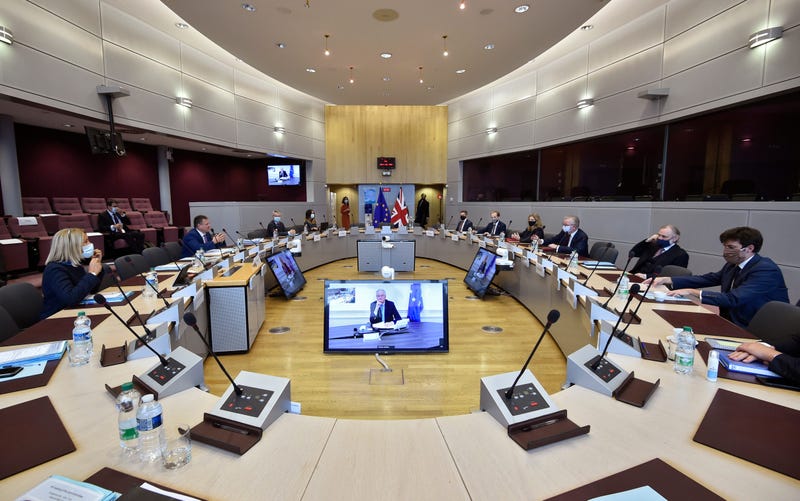
BRUSSELS (AP) — Britain entered a crucial week of post-Brexit talks with the European Union on Monday by rejecting the EU’s demand that it drop plans to breach the legally binding agreement it signed on its departure from the bloc. The EU told British Prime Minister Boris Johnson to brace for a legal fight.
The EU insisted that abiding by every last detail of the international treaty that regulated the U.K.'s departure on Jan. 31 was key to maintaining trust and hopes of salvaging a rudimentary trade deal in the next few weeks.
After a short meeting between the two sides in Brussels, U.K. Brexit planning minister Michael Gove said Britain wouldn't withdraw its Internal Market Bill, which includes clauses to override parts of the Brexit withdrawal treaty.
“Those clauses will remain in that bill” as a safety net in case the U.K. and the EU don't reach a trade agreement, Gove said.
The EU renewed its threat to take legal action if the U.K. doesn't drop the bill, which is currently passing through Parliament.
“We are considering all legal options available to us," European Commission Vice President Maros Sefcovic said.
The rift means that talks between the two sides' trade negotiators will begin Tuesday under an ominous cloud. Britain and the 27-nation bloc have just weeks to strike a deal before a post-Brexit transition period runs out on Dec. 31.
Both sides stand to lose hundreds of thousands of jobs and a big chunk of their income if they fail to find a compromise agreement. Yet Brussels and London have been digging in their heels, both vowing not to compromise on key issues.
European Commission President Ursula von der Leyen warned that the economies of EU countries and the U.K are being “severely hit” by the coronavirus pandemic and that failure to strike a Brexit deal would make things worse.
“We want an agreement,” she told reporters in Lisbon at the start of an official visit to Portugal. “We’re working hard and negotiating. I’m still convinced a deal is possible.”
Irish Prime Minister Micheal Martin said Monday that his government “is preparing its budget in three weeks’ time on the basis that there will be a no-deal Brexit.”
Martin said Johnson’s attempt to pass a law that violates the legally binding EU-U.K. divorce agreement had “eroded trust” and undermined confidence.
If it becomes law, Johnson's Internal Market Bill will give the U.K. the power to disregard part of the Brexit withdrawal treaty dealing with trade to and from Northern Ireland, which shares a 300-mile (500-kilometer) border with EU member Ireland.
Johnson has said he wouldn't put it past the EU to abuse the treaty to put the Northern Irish part of the U. K. in an economic chokehold. The EU denies this and insists the full withdrawal agreement must be respected for fear that it otherwise might reignite tensions on the island of Ireland.
Britain and the EU jointly promised in the Brexit divorce agreement to ensure there are no customs posts or other obstacles on the Northern Ireland-Ireland border, no matter what the final terms of Brexit. The open border is key to the stability that underpins the 1998 Good Friday peace accord that ended decades of violence between Irish nationalists and British unionists.
Sefcovic warned Monday that Britain shouldn't try to use the withdrawal agreement and its Northern Ireland provisions as “a bargaining chip” in trade negotiations.
Johnson’s law-breaching bill has also brought a warning from senior American politicians — including House of Representatives Speaker Nancy Pelosi and Democratic presidential candidate Joe Biden — who said passing it would scupper chances of a U.K.-U.S. trade deal.
On Monday, the U.S. Special Envoy to Northern Ireland, Mick Mulvaney, said there was a chance the bill could place the Norther Ireland peace agreement at risk. On a visit to Dublin, he said that was “something we’re very interested in seeing not happen.”
“We’re here to protect, defend that Good Friday Agreement that was so hard fought and won,” he said after meeting with senior Irish politicians.
Against that background, trade negotiations led by the EU's Michel Barnier and the U.K.'s David Frost will resume Tuesday, hoping to bridge gaps on EU boats' access to U.K. fishing waters and the amount of support that governments are allowed to give to businesses.
The EU has accused Britain of trying to retain the privileges it had as a member of the bloc without following the EU's rules. The U.K. says the bloc is making demands that it hasn't placed on other countries it has trade deals with, such as Canada.
Still, London maintained there was some hope that a deal could be reached before or at an EU summit in mid-October, which Johnson has called the deadline for a deal.
“We expect discussions to continue in the run-up to the European Council” on Oct. 15-16, U.K. government spokesman James Slack said. “Although the last few weeks of informal talks have been positive, there remains much to be done.''
___
Jill Lawless reported from London. Barry Hatton in Lisbon, Portugal. contributed to this report.
___
Follow all developments on the EU-Britain trade talks at https://apnews.com/Brexit.
